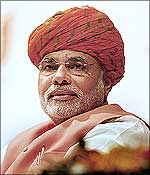|
|
| Help | |
| You are here: Rediff Home » India » Business » Interviews » Narendra Modi, CM, Gujarat |
|
 Narendra Modi | ||
| ||||||||||||||||||||||||||||||||||||||||||||
|
| ||||||||||||||||||||||||||||||||||||||||||||
At a time when the world is looking at India as a market, this man envisages a scenario where Gujarat turns the whole world into a market for whatever it manufactures. Meet Gujarat's third-time Chief Minister Narendra Modi in a freewheeling interview with Harit Mehta and Ashish Amin.
Having silenced your critics in the recently-concluded elections, what is the agenda of your government for the coming five years?
In the previous term, we have been somewhat successful in taking brand Gujarat to the international stage. As a result, foreign investors are looking at Gujarat in a positive manner. We have given top priority to creating infrastructure to cope with the heavy investment inflow.
Investors have thronged the state because of state government's industry-friendly policies. We have also focused on key infrastructure issues such as port inter-linking and port-based SEZs.
The Delhi-Mumbai Industrial Corridor (DMIC) seems to be the new buzzword in the state government? How do you think the project will help Gujarat?
Around 40 per cent of the DMIC project falls in Gujarat. We have prepared a blueprint on how the state can make the most out of the project. Two years ago, we started work on three 'Pragati Paths', planned on the lines of the Ahmedabad-Vapi golden corridor. The idea was to have as many golden corridors as possible. To our good luck, all three Pragati Paths we identified fall along the DMIC. While planning the Pragati Paths two years back, we had not anticipated DMIC in its present form, but we are lucky that the synergies and geographic proximity of both projects will do wonders to the economy of the state.
We have planned logistics parks and special investment regions in the vicinity of the project. Dholera will be the first special investment region. Also, the projects and investment coming under DMIC will benefit because of the port infrastructure of the state.
Recently, a delegation from Japan had come to Gujarat? Was the trip fruitful?
We have been interacting with Japan's trade and industry, apart from the Japanese government, for sometime now. Members of the delegation showed interest in investing in Gujarat, provided a separate zone was created for them in the state. The government is considering the proposal and will take a final decision on it soon. We can even earmark one of the 12 logistics parks being planned along the DMIC for Japanese companies.
Gujarat is attracting investments. But how prepared is the state in terms of providing skilled manpower to cope with the investment inflow?
We have taken the issue very seriously and have prepared a blueprint. But we have equally focused on the knowledge economy - IT, biotech and nanotechnology. Our endeavour is to provide an atmosphere where adequate research in these fields is done. Gujarat International Finance Tec City (GIFT) will remain at the centre stage of not just the state's, but also the country's development. GIFT is a classic case of knowledge economy.
Initiatives like Knowledge Corporation too will help the state's cause. The government has already been instrumental in introducing several syllabi in colleges and universities across the state. Petroleum University is a part of all this.
We believe that around 4 million people will get direct or indirect employment over the next five years in Gujarat.
The perception is that your government is an urban-centric government. Do you agree?
Absolutely not. The focus of our government has always been that jobs go to people so that people don't have to reach out to jobs. The idea is to create an atmosphere where there are enough jobs in village and villagers do not have to come to cities in search of jobs.
Thanks to Jyotigram, villagers have three-phase, 24-hour electricity which has given a fillip to cottage industries. Students can also study during the nights.
GSWAN (Gujarat State Wide Area Network) has connected villages to Sachivalaya (state secretariat).
We are also in the process of creating infrastructure for agri-businesses. In this age of liberalisation, our endeavour will be to make the whole world a marketplace for whatever Gujarat manufactures. We will market brand Gujarat very aggressively.
Are you satisfied with the Vibrant Gujarat summits? Are investments actually coming?
Yes, I am satisfied with the effort, or else we would not have continued. The conversion rate (projects becoming a reality) as far as MoUs are concerned is very satisfying. It is around 80 per cent, which is considered to be very good. We are already planning the next summit, which will be organised in 2009.
Apart from the investments, the bonus is the way the attitude of government officials has changed.
Gujarat has done well in terms of attracting domestic investments. But the state still lags behind when it comes to FDI. Do you agree?
This has to be seen in proper perspective. FDI flow largely depends on the policies of the Centre. I believe the present government has not done enough in the past three-four years to attract FDI aggressively.
What is your government's stand on the recent move to give all Panna-Mukta-Tapti (PMT) rights to GAIL?
The Centre's attitude has been very negative on various state government initiatives. The PMT issue has affected a lot of industries in the state. MPs from Gujarat are likely to take up the issue in Parliament. The state's Gas Act is yet to get the Centre's nod. We will protest against the decision in a democratic manner.
Photograph: Sam Panthaky/AFP/Getty Images
Powered byMore Interviews
|
|
| © 2008 Rediff.com India Limited. All Rights Reserved. Disclaimer | Feedback |